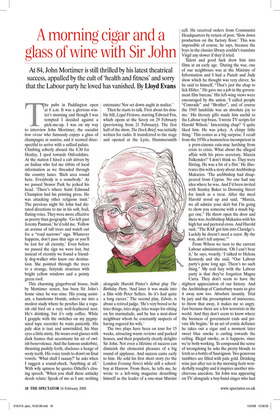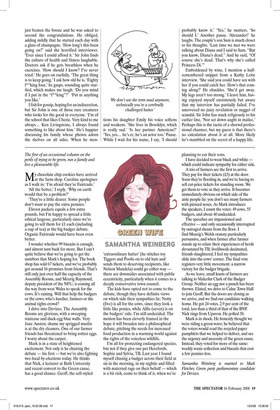A morning cigar and a glass of wine with Sir John
At 84, John Mortimer is still thrilled by his latest theatrical success, appalled by the cult of ‘health and fitness’ and sorry that the Labour party he loved has vanished. By Lloyd Evans The pubs in Paddington open at 8 a.m. It was a glorious winter’s morning and though I was tempted I decided against a pick-me-up. I was on my way to interview John Mortimer, the socialist bon viveur who famously enjoys a glass of champagne at sunrise, and it seemed disrespectful to arrive with a sullied palate. Climbing soberly aboard the 8.30 for Henley, I sped towards Oxfordshire.
At the station I hired a cab driven by an Indian who fed me titbits of local information as we threaded through the country lanes. ‘Rich area round here. Everybody is a somebody.’ As we passed Stonor Park he jerked his head. ‘There’s where Saint Edmund Champion had his printing press. He was attacking other religions innit.’ The previous night Sir John had dictated directions to me in his soft, frail, fluting voice. They were more effective as poetry than geography. ‘Go left past Jeremy Paxman,’ he’d told me. ‘Follow an avenue of tall trees and watch out for a “road narrows” sign. Whatever happens, don’t pass that sign or you’ll be lost for all eternity.’ Even before we passed the sign we were lost, but instead of eternity we found a friend ly dog-walker who knew our destina tion. She pointed through the trees to a strange, fairytale structure with bright yellow windows and a pointy green roof.
This charming gingerbread house, built by Mortimer senior, has been Sir John’s home since he was nine. His young assistant, a handsome blonde, ushers me into a modest study where he perches like a roguish old bird on a very well-feathered nest. He’s drinking, but it’s only coffee. While I grapple with the switches on my pygmysized tape recorder he waits patiently. His pale skin is taut and unwrinkled, his blue eyes a little misty. He wears oval glasses with dark frames that accentuate his air of owlish benevolence. And the famous underbite, thrusting pushily forth, discloses a henge of sooty teeth. His voice tends to drawl on final vowels. ‘What shall I saaaay?’ he asks when I suggest a sound-check. ‘Anything at all.’ With wily aptness he quotes Othello’s closing speech. ‘When you shall these unlucky deeds relate/ Speak of me as I am; nothing extenuate/ Nor set down aught in malice.’ Then he starts to talk. First about his double bill, Legal Fictions, starring Edward Fox, which opens at the Savoy on 29 February (previewing from 21 February). The first half of the show, The Dock Brief, was initially written for radio. It transferred to the stage and opened at the Lyric, Hammersmith alongside Harold Pinter’s debut play The Birthday Party. ‘And later it was made into a film with Peter Sellers. So it’s had quite a long career.’ The second play, Edwin, is about a retired judge. ‘He’s very bored so he tries things, tries dogs, tries wasps for sitting on his marmalade, and he has a next-door neighbour whom he constantly suspects of having rogered his wife.’ The two plays have been on tour for 15 weeks, attracting warm reviews and packed houses, and their popularity clearly delights Sir John. Not even a lifetime of success can diminish the elemental pleasure of a big round of applause. And success came early to him. He sold his first short story (to the London Evening News) while still a schoolboy at Harrow. From there, he tells me, he wrote to a left-wing magazine describing himself as the leader of a one-man Marxist cell. He received orders from Communist Headquarters by return of post. ‘Slow down production on the factory floor.’ This was impossible of course, he says, because the boys in the classics library couldn’t translate Virgil any slower if they’d tried.
Talent and good luck drew him into films at an early age. ‘During the war, one of our neighbours was at the Ministry of Information and I had a Punch and Judy show which he thought was very clever. So he said to himself, “That’s just the chap to lick Hitler.” He gave me a job in the govern ment film bureau.’ His left-wing views were encouraged by the union. ‘I called people “Comrade” and “Brother”, and of course the 1945 landslide was an absolute joy to me.’ His literary gifts made him useful to the Labour top brass. ‘I wrote TV scripts for Harold Wilson.’ Interesting chap? ‘I quite liked him. He was jokey. A chirpy little thing.’ This comes as a big surprise. I recall from the 1970s a humourless incompetent in a porn-cinema rain-mac lurching from crisis to crisis. What about the alleged affair with his press secretary, Marcia Falkender? ‘I don’t think so. They were flirting. He was a bit of a flirt.’ He illustrates this with a story about Archbishop Makarios. ‘The archbishop had disappeared from Cyprus. No one had any idea where he was. And I’d been invited with Stanley Baker to Downing Street for lunch as a treat. After the meal Harold stood up and said, “Marcia, we all admire your skirt but I’m going to show you someone with a much bigger one.” He threw open the door and there was Archbishop Makarios with his high hat and pectoral cross. And Harold said, “The RAF got him into Claridge’s. Luckily he doesn’t need a razor. By the way, don’t tell anyone.”’ From Wilson we turn to the current Labour administration. ‘Oh I can’t bear it,’ he says, wearily. ‘I talked to Helena Kennedy and she said, “Our Labour party’s gone long ago. There’s no such thing.” My real fury with the Labour party is that they’ve forgotten Magna Carta. They don’t seem to have the slightest appreciation of our history. And the Archbishop of Canterbury wants to give it away now too. Absolute insanity. Trial by jury and the presumption of innocence, to throw that away, it makes me so angry. Just because there are a few terrorists in the world. And they don’t seem to know where the business of government ends and private life begins.’ In an act of comic defiance he takes out a cigar and a moment later sweet blue smoke is curling towards the ceiling. Illegal smoke, as it happens, since we’re both working. To compound the sense of wrongdoing he asks the pretty blonde to fetch us a bottle of Sauvignon. Two generous tumblers are filled with pale gold. Drinking wine just after ten in the morning feels wonderfully naughty and it inspires another mischievous anecdote. Sir John was appearing on TV alongside a boy-band singer who had just beaten the booze and he was asked to second the congratulations. He obliged, adding mildly that he started each day with a glass of champagne. ‘How long’s this been going on?’ said the horrified interviewer. ‘Ever since I could afford it.’ Sir John finds the culture of health and fitness laughable. Doctors ask if he gets breathless when he exercises. ‘How should I know? I’ve never tried.’ He goes on ruefully, ‘The great thing is to keep going.’ I ask how old he is. ‘Eighty f**king four,’ he gasps, sounding quite startled, which makes me laugh. ‘Do you mind if I put in the “f**king”?’ ‘Put in anything you like.’ I fish for gossip, hoping for an indiscretion, but Sir John is one of those rare creatures who looks for the good in everyone. ‘I’m of the school that likes Cherie. Very kind to me always... Ken Livingstone, I always found something to like about him.’ He’s happier discussing his family whose photos adorn the shelves on all sides. When he men tions his daughter Emily his voice softens and weakens. ‘She lives in Brooklyn, which is really sad.’ ‘Is her partner American?’ ‘Yes, yes... he’s er, he’s an actor too.’ Pause. While I wait for his name, I say, ‘I should probably know it.’ ‘Yes,’ he mutters. ‘So should I.’ Another pause. ‘Alexander!’ he laughs. The couple’s son Sam is much closer to his thoughts. ‘Last time we met we were talking about Diana and I said to Sam, “But you know, Diana’s dead.” And he said, “Of course she’s dead. That’s why she’s called Princess Di.”’ Emboldened by wine, I mention a halfremembered snippet from a Kathy Lette interview. ‘She said you could have sex with her if you could catch her. How’s that coming along?’ He chuckles. ‘She’d get away. My legs aren’t too strong.’ I leave him, having enjoyed myself enormously but aware that my interview has partially failed. I’ve uncovered no juicy revelation or nugget of scandal. Sir John has stuck religiously to his earlier line, ‘Nor set down aught in malice.’ Perhaps this is the tactic of a shrewd professional charmer, but my guess is that there’s no calculation about it at all. More likely he’s stumbled on the secret of a happy life.



















































































 Previous page
Previous page